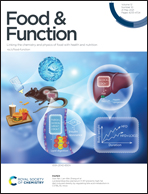Transcriptome analysis reveals the protective role of fructo-oligosaccharide in colonic mucosal barriers in exercise-induced stressed mice†‡
Abstract
Most athletes continually endure mental and physical stress from intense exercise. Fructo-oligosaccharide (FOS) can reduce physical exhaustion, but the concrete mechanism behind it still needs further research. In this study, the effect of FOS on colonic mucosal barriers was investigated using an exercise-induced stress mouse model. Except for control individuals, mice were subject to cycles of 2-day exercise (at 20 rpm) interleaved by 5-day rest. The mice experienced a total of 6 days of exercise during the feeding period. FOS improved common indicators of exhaustion, such as glycogen storage in muscle. 16S rRNA data supported that changes in the gut microbiome were also closely related to stress status. Notably, Anaerotruncus was increased in mice under stress, while FOS facilitated the growth of Dorea, which is negatively associated with exhaustion. The RNA-seq analysis revealed that FOS could maintain the integrity of colonic epithelial barriers. For example, FOS significantly restored the expression of tight junctions (Occludin and Zonula occludens-1) in the colon, which was impaired under a stress state. Besides, the NOD-like receptor family pyrin domain containing 6 (NLRP6) inflammasome might contribute to the protection of the colonic mucosa by promoting the secretion of IL-18, Mucin2 (Muc2) and intestine lectin 1 (Itln1) in FOS-treated individuals. In short, FOS administration attenuated the damage of colonic mucosal barriers in exercise-induced stressed mice.



 Please wait while we load your content...
Please wait while we load your content...